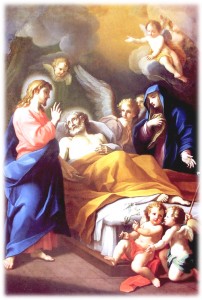 “The day of the Lord will come like a thief in the night.” (1 Thess 5.2)
“The day of the Lord will come like a thief in the night.” (1 Thess 5.2)
In his first letter to the people of Thessalonica, probably the earliest of the books of the New Testament to be written, less than twenty years after Christ’s ascension, St Paul talks about the resurrection of Christ and our resurrection. He makes it clear that the end is uncertain, so we must always be watchful.
The Day of the Lord for us individually may be the end of the world or, more likely, our own death. At this time of the year, we remember the Holy Souls. As also with funerals throughout the year, as well as praying for those who have died, we are given salutary reminders in the sacred Liturgy of the four last things, also called “the eternal truths”: death, judgement, hell and heaven. Very many of the saints left us powerful sermons and writings on these important truths.
Our culture shuns talk of death and eternal life. Yet since our life on earth is short and we face eternity, it is only sensible that we take time not only to ponder these things prayerfully, but also to order our lives prudently in the light of eternity. We were created by God to know Him, love Him and serve Him in this world and to be happy with Him for ever in the next. A holy priest once said that many people live lives on this earth in the manner of a dog at a birthday party. The dog has no idea what is going on, but has a great time being hoovering up bits of food and birthday cake that have fallen on the floor, and generally enjoying the fun. Our life on earth is not simply to have fun, but to love God and make our way to heaven.
St Augustine said “God promises us His grace, he does not promise us tomorrow.” If we are in a state of grace, we do not need to fear death. St John Bosco did tremendous work in Turin for thousands of poor young people. When he was asked what was his principal aim in life, he said, “To remain in a state of grace.” This attitude is not simply “other-worldly,” since remaining in a state of grace requires avoiding sin which harms ourselves and others, and carrying out works of charity by which we make this world a better place. Hence St John Bosco’s enormous contribution to the good of society.
Awareness of our death is embedded in our faith and prayers but we can easily “tune out” references to death and eternity, perhaps finding only what we want to find.
At the Mass, when we say the Creed, we “look forward to the resurrection of the dead”; in the Canon, we pray to be delivered from eternal damnation and we ask to share in eternal life with the saints. After the Our Father, we await the blessed hope of the coming of Christ. Every day in the Hail Mary, we ask our Lady to pray for us sinners, “now and at the hour of our death.” Let us deepen our awareness of the eternal truths and think of them often, so that we live better lives here on earth, make the world a better place, while also preparing ourselves so that we do not presume to take our eternal destiny for granted, but genuinely seek and take those steps necessary in our lives so that we may enjoy God’s presence for eternity when the Day of the Lord comes for us.
Sermon preached by Fr Finigan at St Austin and St Gregory, Margate, 33rd Sunday of year A, 16 November 2014.
